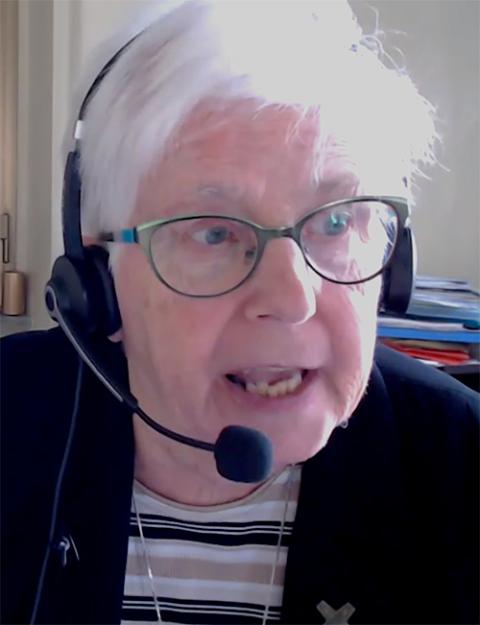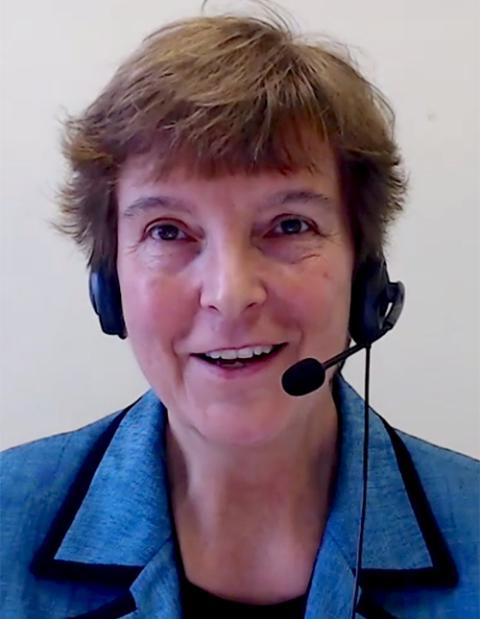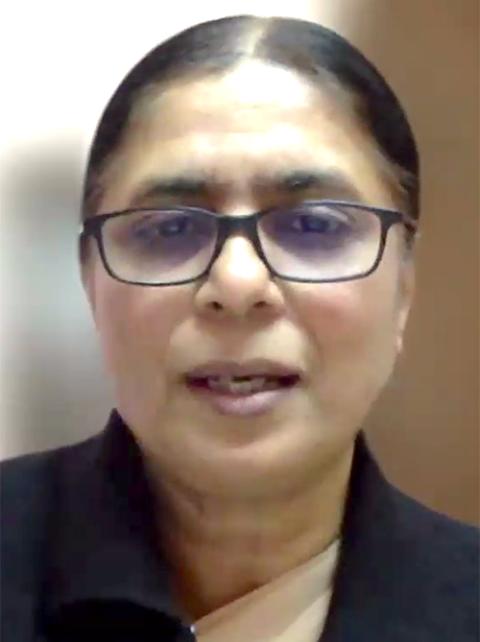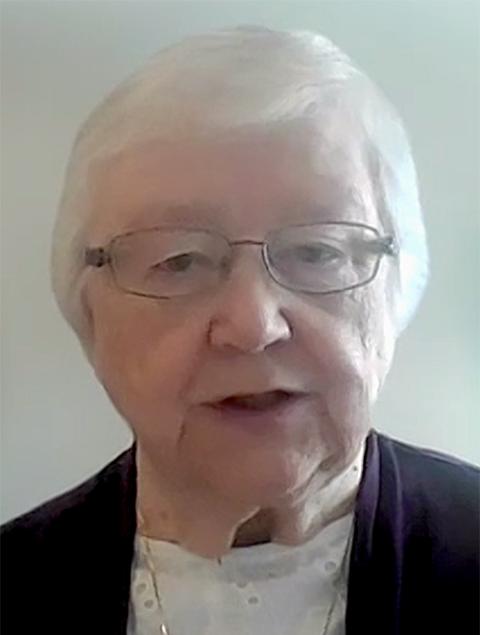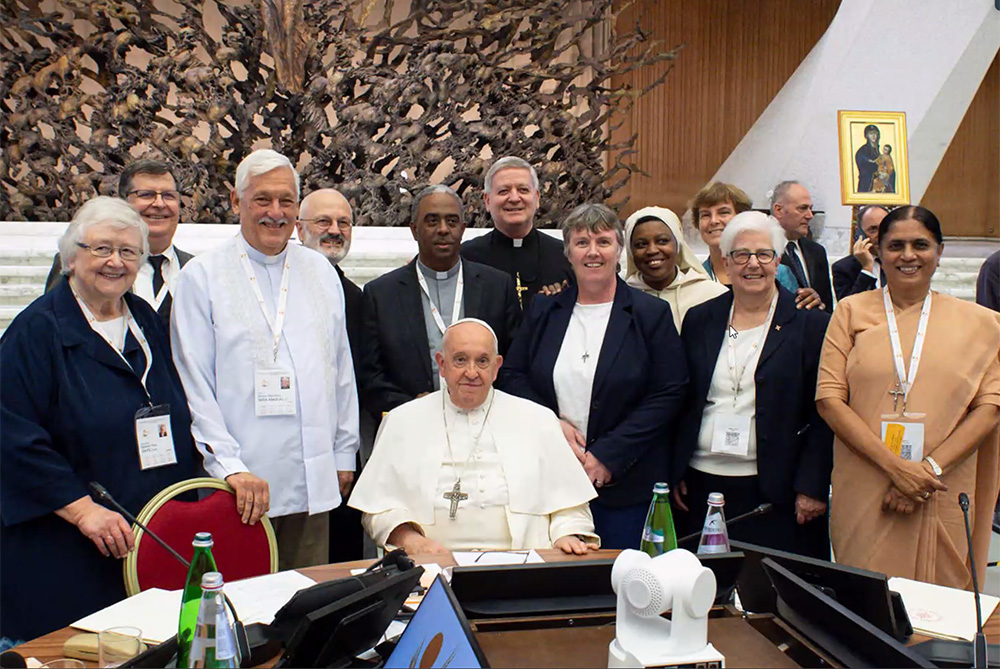
Delegates from the International Union of Superiors General pose with Pope Francis during the Synod of Bishops at the Vatican in October. (GSR screenshot)
You did not have to be present at the synod on synodality in Rome to take part in the landmark event, said sisters who were there.
The International Union of Superiors General (UISG) on Wednesday, Dec. 6, hosted a webinar for its synod delegates to share their experiences and what they took away from the monthlong process. A second webinar on the synod is planned for Dec. 13.
For the first time since the establishment of the church's Synod of Bishops in 1965, about 50 women were granted voting rights by the pope at the assembly. The synthesis report, created at the end of the process, summarizes the month of discussions and sets up a road map for discussions to take place around the world over the next 11 months. The final session of the synod is set for October 2024.
Sr. Patricia Murray, a member of the Institute of the Blessed Virgin Mary (Loreto Sisters) in Ireland and the executive secretary of UISG, called the synod "a profound experience" for her and "a time of deep conversion."
She said the process was an individual one as well as a collective one for the 450 participants.
"We were being invited to undertake a spiritual journey as God's people," Murray said. And since the synodal process can be used in any group, "you are invited to take part in God's journey. You may not have been in the synod hall, but you're part of it because you're here."
Murray said the Holy Spirit guided the journey through deep listening to one another, which connected participants as individuals and also as a global church.
"At the tables, we listened deeply to one another," she said. "That deep listening is a spiritual practice and we practiced it at every session, so we were in a school of the heart."
Advertisement
Murray, and other webinar participants, noted that the small-table discussions put everyone — from cardinals to laypersons — on an equal footing.
"Pope Francis reminded us that we are brothers and sisters from every tribe and every nation ... called to the same hope," Murray said. "This enormous diversity and variety, of every level, is the defining experience I had throughout the entire synodal experience. ... The words were equally important as we listened to where the Spirit is leading the church."
Religious of the Sacred Heart Sr. Maria Cimperman, who is a coordinator of synodal activities for the UISG, said the deep listening had a profound effect.
"Instead of lobbying each other, first we built community. A space where we could say, 'I fear this,' but also 'I hear this' and 'My people long for this,' " Cimperman said. "We prayed through everything. ... We did more listening than speaking. There was so much silence."
UISG president Sr. Mary Barron, congregational leader of the Sisters of Our Lady of Apostles, said even those who spend much of their lives in prayer can learn from the synod.
"The importance of prayer for the synodal journey cannot be overemphasized. We may spend many hours of prayer together in community, but," Barron asked, "does our style of prayer" make participants equal and include every voice? "We do not function as a democracy, but we must recover an ecclesial and spiritual experience of discernment and consensus-building."
Sr. Elysée Izerimana, general concillor of the Sisters Workers of the Holy House of Nazareth, said synodal prayer must become a way of life for the church.
Sr. Maria Nirmalini, superior of her congregation of Apostolic Carmelites and president of the Conference of Religious, India, said the equality at the synod was a sharp contrast to the hierarchal structure in the church and the abuse of that power.
"It made us reflect on shadows, our vulnerabilities, especially the abuse of religious," Nirmalini said. "It is not an easy time to be a religious in India."
But she said she also took that as a challenge to herself.
"It is important to begin in our own spaces of work, to make a synodal space for worship, where every voice matters. There's lots of talk of hierarchy in the church, but let's be honest, hierarchy also exists in our religious institutes," Nirmalini said. "It made me reflect on my own life and my style of leadership."
Izerimana also touched on abuse of religious that comes from a hierarchy and clericalism.
"For some, authority gives privilege to act as they wish instead of as a service to others. It's a distorted view of authority," Izerimana said. She noted that the vow of obedience is a vow of mutual respect — "far from blind submission."
She said the abuse of religious by those in authority requires an update of a 1978 Vatican document Mutuae Relationes, which outlines the relationship between bishops and religious. Francis called for the update in November 2013 and sisters in leadership have been asked over the years to weigh in on it, but there has been no sign of its release.
Sr. Elizabeth Davis, a member of the Congregation of the Sisters of Mercy of Newfoundland and Labrador, Canada, joined in the call for an update to Mutuae Relationes, saying the abuse of religious means it is needed more than ever.
Davis also said that some sisters were disenchanted by some parts of the synthesis report, which calls male and female "two distinct experiences of being human," and discusses "the complementarity and reciprocity of women and men."
She said that dualism contradicts the report's statement that "women and men are clothed with the same baptismal dignity."
Cimperman said that those who were hoping to see bold changes in the church did not understand what this year's session was about.
"It was not about hot-button issues," she said, "but what does it mean to be church."

